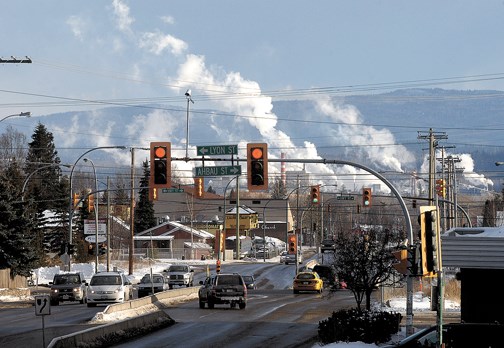Dusty times call for desperate measures and Prince George was on red alert status for most of the week with air quality advisories in effect.
After weeks of clean air conditions, the cold air returned to the city on Monday and brought with it a temperature inversion that trapped fine pollutants, mostly road dust, which cast the city in a thick haze.
The timing was ironic and somewhat fitting, considering the Prince George Air Improvement Roundtable hosted the North Central B.C. Clean Air Forum on Wednesday and Thursday, just when the advisory came into effect.
"It actually accents the meeting quite well because we're living it and every time we think about the airshed, we're breathing in a dust advisory, which adds to the theme of the conversation," said PGAIR chair Terry Robert. "We're not pleased there's an air quality advisory, but we're pleased it has articulated the need for continued vigilance related to dust."
During the conference, several industry representatives on the PGAIR committee -- Columbia Bitulithic, Carrier Lumber, Canfor Pulp, Pacific BioEnergy and Husky Energy -- explained changes their companies have made to improve the city's air quality. Collectively, as a result of the willingness of companies to find ways to reduce air pollution and federal government grants to cover the cost of upgrades to improve filtering technology, there's been a noticeable drop in the number of stinky days in the city.
"The exciting thing we're hearing is we've made some significant progress in reducing the sulphur smell within the community," said Robert, regional manager for the Fraser Basin Council which administers the PGAIR society. "We think that will help the community attract new residents and new types of economy that can set up here and establish longterm roots."
Robert said PGAIR will now shift its focus to the transportation sector as a source of pollution and will take steps to influence changes that clamp down on the heaviest contributors to foul air. PGAIR estimates transportation-related emissions account for about 35 per cent of the total ambient air pollution in the city's airshed.
"Transportation issues are one of those areas that cover everybody -- we all drive or take public transit -- and there's no one jurisdiction responsible for it," said Robert. "We'll try to get larger fleets like Purolator to reduce their emissions, then we'll look at what the public sector fleets like [B.C.] Transit are doing to reduce their emissions. We will be looking to work with Prince George Airport and the rail organizations to see if we can further enhance reductions in their operations in the city limits.
"Our bang for our buck on ambient emission reductions can be realized through a significant drop in transportation emissions. We're asking reasonable people to do reasonable things to improve the airshed and if we all take some of these smaller actions it can lead to some significant improvements."
PGAIR will also continue to promote special events like Bike to Work Week, set this year for May 27-June 2. The group will continue to encourage motorists to shut off their engines rather than have them sit idling and through its Burn It Clean woodstove exchange program will work to educate homeowners on the merits of using only well-cured wood that burns hotter and cleaner.
The city's Clean Air Bylaw which governs street sweeping operations also extends to owners of private, retail or commercial parking lots. That means everyone, public sector or private, is required to spray dust suppression liquids on road surfaces or parking lots before sweeping or maintenance operations can take place. Robert said most of the complaints directed to PGAIR about dust from street sweeping comes from clean-up operations on private land.
"There are large tracts of paved areas that are within the private sector, they're not owned by the municipality and we'll be working with them to help them develop dust mitigation plans," said Robert. "They work with the private sector companies that are removing the aggregate from the roads and we'll help them try to understand the new street sweeping technologies and practices that are out there and try to bring them to Prince George."


